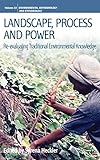Landscape, Process and Power : Re-evaluating Traditional Environmental Knowledge / ed. by Serena Heckler.
Material type: TextSeries: Environmental Anthropology and Ethnobiology ; 10Publisher: New York ; Oxford : Berghahn Books, [2009]Copyright date: ©2009Description: 1 online resource (304 p.)Content type:
TextSeries: Environmental Anthropology and Ethnobiology ; 10Publisher: New York ; Oxford : Berghahn Books, [2009]Copyright date: ©2009Description: 1 online resource (304 p.)Content type: - 9781845455491
- 9781845459048
- 333.72
- GF50 .L35 2009
- online - DeGruyter
| Item type | Current library | Call number | URL | Status | Notes | Barcode | |
|---|---|---|---|---|---|---|---|
 eBook
eBook
|
Biblioteca "Angelicum" Pont. Univ. S.Tommaso d'Aquino Nuvola online | online - DeGruyter (Browse shelf(Opens below)) | Online access | Not for loan (Accesso limitato) | Accesso per gli utenti autorizzati / Access for authorized users | (dgr)9781845459048 |
Frontmatter -- Contents -- List of Figures and Tables -- List of Contributors -- Foreword -- Chapter 1 Introduction -- Chapter 2 A Genealogy of Scientific Representations of Indigenous Knowledge -- Chapter 3 The Cultural and Economic Globalisation of Traditional Environmental Knowledge Systems -- Chapter 4 Competing and Coexisting with Cormorants Ambiguity and Change in European Wetlands -- Chapter 5 Pathways To Developmen Identity, Landscape and Industry in Papua New Guinea -- Chapter 6 How Do They See It? Traditional Resource Management, Distrubance and Biodiversity Conservation In Papua New Guinea -- Chapter 7 Wild Plants as Agricultural Indicators Linking Ethnobotany with Traditional Ecological Knowledge -- Chapter 8 How Does Migration Affect Ethnobotanical Knowledge and Social Organisation in a West Papuan Village? -- Chapter 9 Reproduction and Development of Expertise Within Communities of Practice A Case Study of Fishing Activities in South Buton (Southeast Sulawesi, Indonesia) -- Chapter 10 Review of an Attempt to Apply the Carrying Capacity Concept in the New Guinea Highlands Cultural Practice Disconcerts Ecological Expectation -- Chapter 11 Managing the Gabra Oromo Commons of Kenya, Past and Present -- Index
restricted access online access with authorization star
http://purl.org/coar/access_right/c_16ec
In recent years, the field of study variously called local, indigenous or traditional environmental knowledge (TEK) has experienced a crisis brought about by the questioning of some of its basic assumptions. This has included reassessing notions that scientific methods can accurately elicit and describe TEK or that incorporating it into development projects will improve the physical, social or economic well-being of marginalized peoples. The contributors to this volume argue that to accurately and appropriately describe TEK, the historical and political forces that have shaped it, as well as people’s day-to-day engagement with the landscape around them must be taken into account. TEK thus emerges, not as an easily translatable tool for development experts, but as a rich and complex element of contemporary lives that should be defined and managed by indigenous and local peoples themselves.
Mode of access: Internet via World Wide Web.
In English.
Description based on online resource; title from PDF title page (publisher's Web site, viewed 25. Jun 2024)


